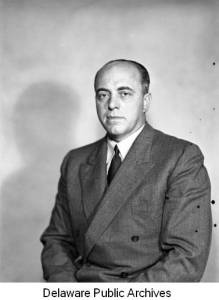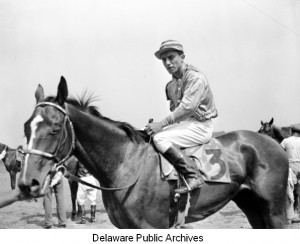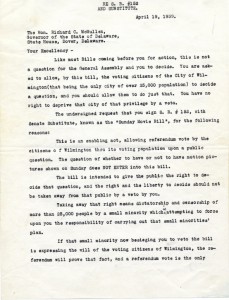The great Delaware blue laws crackdown of 1941
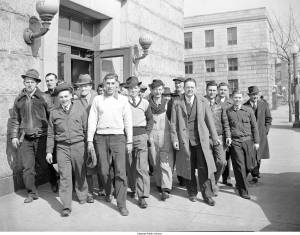
Just a few of the nearly 500 people arrested on one Sunday in 1941 for breaking Delaware’s blue laws, pose for a photo at the Wilmington police station.
I’ve previously posted about the blue laws, or Sunday closing laws, of Delaware. Originally passed in 1795, Delaware’s strict blue laws, prohibiting “any worldly employment, labor or business” on Sunday were still in effect in the first half of the 20th century, although they were rarely enforced. In 1911, Delaware’s blue laws made the news when Arden residents, including the writer Sinclair Lewis, were arrested for playing baseball and tennis on Sunday. There were calls for reform of the blue laws, but the Delaware General Assembly couldn’t agree to pass a bill repealing them. In 1941, a crusading attorney general named James R. Morford declared war on the state’s blue laws.
James R. Morford was elected Delaware’s attorney general in 1938, fresh from a stint as Wilmington’s city solicitor. While city solicitor, he was part of a successful campaign to clean up corruption in the Wilmington police department. Morford strongly felt that having laws on the books that were only occasionally enforced, caused disrespect for the law and contributed to corruption of public officials. Frustrated by the General Assembly’s failure to enact reforms, he threatened to begin enforcing the blue laws strictly. In 1939, he asked the State Police to conduct a survey of the number of people breaking the blue laws, but no actual arrests were made. In 1940 he made a speech strongly stating his opposition to any laws that were not uniformly enforced, including the blue laws.
We have thereby created uncertainty as to what an honest citizen may or may not do, but we have created a situation where he may do an act one day and be apparently a law abiding citizen while the same act next day may subject him to arrest… But the worse feature is that by substituting the discretion of a man for the mandate of the law we have gone far to destroy respect for all law and have opened a door for graft and corruption in public office.
In 1941, when the Delaware General Assembly once again failed to pass a proposed bill reforming the blue laws, Morford decided to force them into action. Delaware papers carried the news that starting on Sunday, March 2nd, the blue laws would be strictly enforced. State and local police forces received orders from the Attorney General to arrest everyone found violating the law. All over the state police arrested taxi drivers, bus drivers, newspaper vendors, restaurant workers, gas station attendants, even the general manager of WDEL radio. Around 500 arrests were made that Sunday, swamping police stations and the courts.
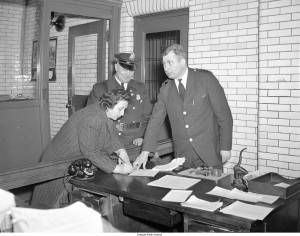
Lena Blatman, owner of a Wilmington bakery, at the police station after being arrested for violating the blue laws.
Morford’s ploy worked, as the General Assembly finally passed a reformed blue laws bill on Friday, March 7th (it was approved by the governor on the 14th), narrowly avoiding another Sunday crackdown. State prosecutors dropped all of the pending cases against blue law violators.
Photos from the Delaware Public Archives. There are more photos of people arrested on March 2nd at the Delaware Public Archives digital collections page.
